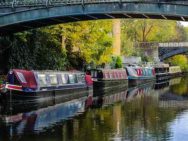
Biggest off-grid area in Britain – on the water
British Waterway authorities have unveiled the largest off-grid community in Britain – on the canals of Hackney.
Yes, living aboard is booming in the UK and maybe they are onto something. It seems like a happy medium for some. You have the freedom of not paying rent or a mortgage, plus the very rewarding chance to be self-sufficient and independent. But instead of being isolated on a mountain top (which to some may be heaven), you could be doing all this whilst still living in a 24/7 hour city like London. A humble abode that is unplugged and all yours, inside the hustle and bustle of urban city life!
What you need to know about living on the water before taking the plunge:
Firstly, it’s not as easy as just buying a boat, finding some water and setting up camp for the next 30 years. Everyone using canals and waterways needs to have a boat licence, an up-to-date boat safety check and valid insurance. Once that’s all done, you then you have two choices of lifestyle. You can either get a resident mooring, which enables you to stay in one area for as long as you like. A permanent mooring is ideal if you don’t want to move around, but can be expensive and hard to come by. While a mooring of this type can be had for around £6,000 annually in less popular areas, staying somewhere like the Docklands or Islington will cost over £20,000 a year.
The other option is to cruise continuously – in which case all you need is the boat licence, which ranges from £510.62 to £1,110.32 annually, depending on the size of your boat. Boats are allowed to moor almost anywhere alongside canal towpaths. The main rule with this type of lifestyle is that you need to be moving at least every 14 days and can’t go back and forth between two spots. The recommended cruising range is at least 20 miles a year. It isn’t the most secure way of living, but it has to be done this way to consider all ‘liveaboards’.
Canal and River Trust (CRT) have taken over from British Waterways the job of managing our canals and some rivers. For many years BW publically discouraged ‘liveaboards’, but did little about it. Living on a boat was seen, rightly or wrongly, as a way of avoiding paying rent and rates or of getting to the top of the council house waiting lists. The freedom of living afloat with low overheads was thought to appeal to many people who wanted to ‘turn their backs on consumer society’. Equally, though some of the most desirable London properties float on the Thames or Regents Canal, and many people retired, sold the house and moved onto a canal boat to explore their own country.
Recently, possibly partly because of a shortage of economic …


